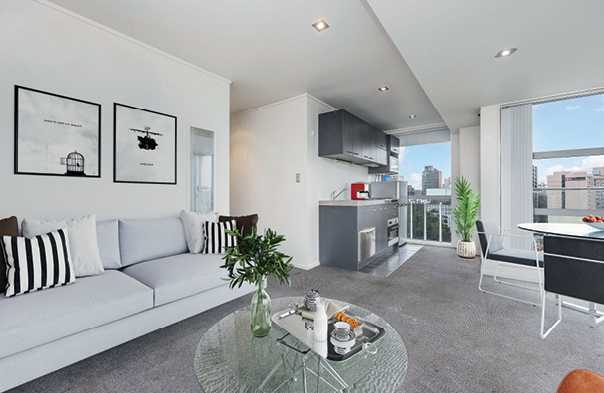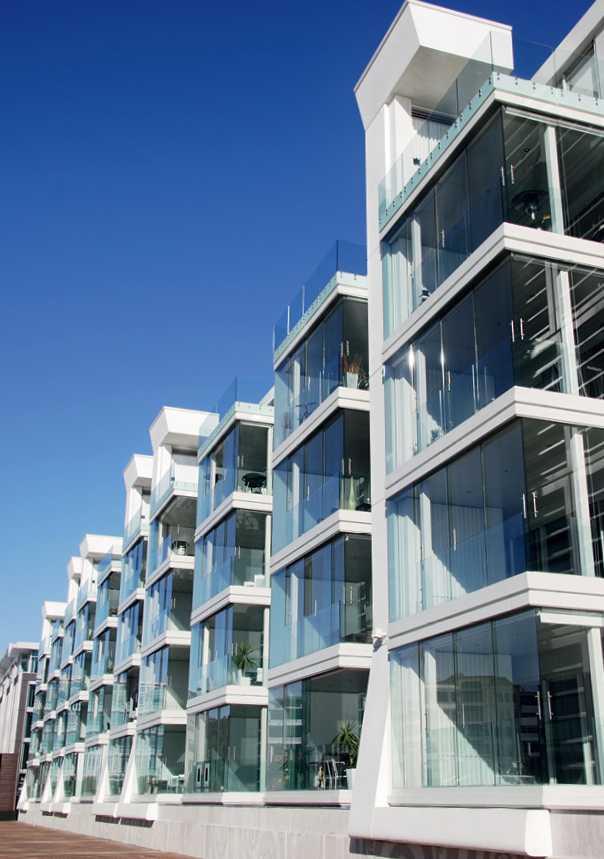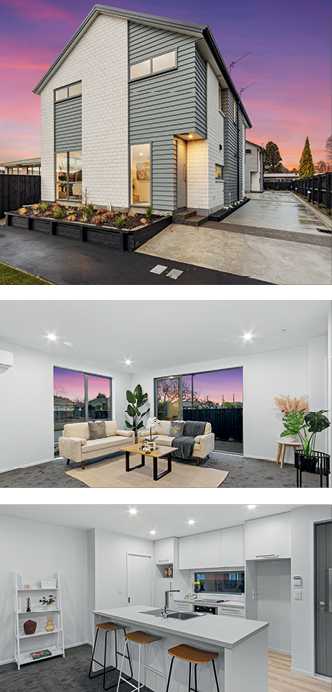
The Ups And Downs Of Apartments
The apartment market is unpredictable at the best of times, but this year it has been tougher than even 2008’s global financial crisis and what has been selling has turned on its head, Sally Lindsay writes.
1 September 2023
Buyers who don’t need a mortgage are still in the market for apartments says City Sales’ Scott Dunn.
Two years ago, Auckland’s apartment market was in a slump with students and workers on visas fleeing back to their own countries as the pandemic swept the globe.
The market is improving and is a lot better than it was two months ago, says City Sales sales manager Scott Dunn. “But hindsight is a funny thing and I would say this year has probably been the hardest year since I have worked in real estate.”
Although his time in the industry doesn’t stretch as far back as 2008, Dunn says agents in his office and investors, who have been in the game for 20 years, say this is the worst it has been.”
By this, he means the whole property sector, not just apartments – property sales, listing numbers and buyer inquiry have been slow.
At City Sales, March was good, April slowed, May was ground zero, June perked up and July has been healthy.


Two-bedroom apartments at Auckland CBD’s Volt are selling for around $100,000 less than a year ago.
Not What Is Expected
What has been flying out the door at the agency are leasehold and remedial apartments. “In any normal market buyers steer well clear of these apartments because they are difficult to sell. In this market they are going out the door swiftly because they are cash purchases. Banks don’t lend on them.
"Conversely, any listing we have that requires a mortgage is hard to sell because mortgages are expensive,” Dunn says.
He says the market rises and falls on interest rates. Before the OCR and interest rates lifted, the easiest sale in the apartment market was a two-bedroom unit with a car park at the $700,000-900,000 mark.
“Now people who need to borrow, say $700,000, on one of those, and with interest rates at about 7 per cent, it’s costing them a fortune. So they are now hard to shift, but anything which doesn’t require a mortgage is selling well.”

There are currently more tenants than apartments in Auckland.
Investors Back Again Slowly
Investors are starting to hesitantly come out of the woodwork after sitting on the fence for two years over the removal of tax deductibility on mortgage interest payments and high interest rates, Dunn says.
“They are starting to get a renewed sense of confidence, but I think it will take until after October’s election, and if there’s a change of government, before we start really seeing them coming back into the market.”
He says investors feel like they are being crucified not only with high interest rates, tax deductibility, but also healthy homes compliance and the Residential Tenancies Act. “They just feel that everything is stacked up against them and many are exiting the market. We have investors saying, ‘Look, I just don’t want to be a property investor anymore. It’s too expensive, it’s too tough, and everything’s against us,'” Dunn says.
High interest rates are the main reason for selling, he says. “Investors would probably hold on for a better market if they could, but it is meaning many can’t afford other things because the bank is sucking up a whole lot more every week than it was before. They are making the decision to cash in the investment property so that they are not in such a tight spot financially,” he says.
However, while investors may want to sell there are not many other investors in the market to buy.
In the capital, not many investors are selling, says Tommy’s Real Estate apartment specialist John Kettle. If an investor has a stable tenant they keeping their rental/s. “Those who are selling say it’s for the normal reason – retirement, moving or the kids have left university. I haven’t seen any distressed sales.”
Low investor sales could be because most of Wellington’s apartments are owner-occupied rather than being investor held. Originally many apartments were built for the investment market, says Kettle. “Now we are finding owner-occupiers are outbidding investors, who can’t make the numbers work to keep it as a rental. Investors have a bottom line, owner-occupiers don’t, they want somewhere to live. So there’s a different mindset. Investors are numbers driven and the decision is ruled by the head rather than the heart.”
Christchurch investors have started buying again. “Investor interest has been huge on a two-bedroom, two-bathroom, one-carpark townhouse in Armagh Street,” Connor Cleine of Harcourts Christchurch City says.
He recently sold a Bishop Street, St Albans property to an investor, who was coming back into the market for the first time in a long time. “A few people are in motion in terms of the investment space, but there is an election in a few months and in my experience, investors have tended to stay back, he says.
“At the same time, a few of them have also said that should we see a new government and it becomes more beneficial to be an investor, then prices might start coming up.
There are certainly a few people looking into what they want to do in the investment space, but it is all about timing.”
Affordability Still A Problem
In Auckland, first home buyers' and movers' interest may start again once interest rates start going down, Dunn says. “The kinds of apartments they are looking at – even though the purchase price might be better than it was a year ago, and it is – their affordability still hinges on interest rates, which are high. So they are in the market, but they’re struggling to gain traction.”
Dunn gives as an example of prices dropping – Volt at 430 Queen Street, Auckland CBD, where a two-bedroom apartment used to sell for about $400,000 just over a year ago and it is now selling for between $290,000-$320,000.
“So in that building alone, it’s a huge 25 per cent drop.” The complex is 90-100 per cent investor owned. Price drops in mainly owner-occupied apartment buildings have not been as big.
For a one-bedroom apartment in the capital, buyers can expect to pay $650,000- $800,000, Kettle says.
For a two-bedroom, one-bathroom apartment, buyers are paying between $750,000-950,000 for an average unit with a car park.
In Christchurch apartment and townhouse prices have fallen. A new two-bedroom, one-bathroom, and one-car park, townhouse in Phillipstown near the CBD is selling for $499,000.
However, location plays a big part in prices, Cleine says. He has a block of two-bedroom, two-bathroom units each with a carpark at Bishopdale in the Burnside High School zone, and the developer is asking for more than $650,000 each. “So location is a massive part that plays into that.”

New build townhouses and apartments are popular options in Christchurch, but developers are having to be more realistic around pricing.
Projects Few And Far Between
In the country’s biggest city apartment rents have sprung back to pre-Covid levels. Rents dropped 20 per cent during Covid and half of City Sales rental book was empty. Few of the rentals are now vacant and any vacancies are quickly filled. Dunn says there are more tenants than rentals and some renters have been looking for weeks or months.
Expected to exacerbate the problem in the next few years is a lack of new developments on the horizon. Anything under construction was sold a couple of years before building began. Dunn says he is not aware of any new developments for the CBD, although he is aware of a few smaller, low rise, complexes outside of the CBD. “It’s different to a couple of years ago when the skyline was littered with cranes.”
Wellington’s development market is in a hiatus, says Kettle. “There are a lot of developers sitting on their hands and it doesn’t look like there are new development coming on."
In Christchurch some of the city’s bigger development companies have cancelled build sites in other centres and are just focusing on the main places where business is going well, Cleine says.
Kettle says there are many things affecting developers. “It’s not just government legislation, there are the costs of materials, the availability of labour and rising interest rates have an effect as well.
“Apartments in the capital are generally speaking getting smaller and when people are buying off the plans they don’t fully realise what they’re getting, but it seems to be a trend to go smaller. Facing enormous costs, developers are maximising the number of units they can get on a piece of dirt, but I think that will probably backfire in a few years when people understand that more space is better.”
There is uncertainty about where the apartment development market is heading in Wellington. Kettle says the city must be getting close to running out of places to build but developers seem to defy the odds. “They are an interesting breed in themselves. You’ve got to admire them for the way they see opportunities.”
Listings for apartments make up about 17 per cent of Wellington’s housing market. In July, there were 520-530 listings from Seatoun through to Khandallah and Te Aro. About 100 of those listings were for apartments.
Kettle says the number of apartment listings is disproportionately higher than what it normally would be, although there is a trend towards that type of living in Wellington.
Listings fell back to 500 then 450 when the country came out of Covid for the first time and that fuelled supply and demand leading to a boom while interest rates dropped at the same time.
Now listings are at about 1,000, typical for a July. The primary listings are for two-bedroom, one-bathroom apartments, but Kettle says buyers prefer two-bedrooms with two-bathrooms and a car park.
Te Aro basin is predominantly the apartment precinct, and prices dropped but have come back to what they were three years ago. “The market did an interesting bell curve in Te Aro. It went right up and then came right back down again and it is now fairly much where it was three years ago.,” Kettle says.
He doesn’t see the market going any lower. “We’ve seen some green shoots already this year.”
Opting For Compact Living
In the South Island, Christchurch is a city where people can still afford to buy a piece of land and build a house, but many are opting to live close to the city and are happy to have compact living in either an apartment or townhouse with just a car park.
Most of the city’s high density living is close to the CBD and apartments and townhouses throughout the city outnumber buyers.
Of the 1,800 listings a good portion are newly bult townhouses Cleine says. “Developers are having to come to the party a bit more in price. Eighteen months ago when money was a lot cheaper, it was feasible to get into a townhouse by borrowing for a new build through the bank. Since then sales haven’t quite caught up with the level of stock available.”
The Bishopdale units he is selling didn’t have any inquiry while under construction, but now they are nearly ready, he has started to see some people come out of the woodwork. “For a developer selling their apartments or townhouses, they need to have a tangible, finished product people can imagine moving into. Gone are the days of buyers purchasing off the plans.
Many buyers are taking their first step onto the property ladder and the market is more active than it has been for a while. Cleine recently had a Spreydon first-home buyer category listing that had 82 groups through it over three weeks. Most buyers were in the budget range $550,000-$650,000 and indicated they felt prices were on the way up. Cleine thinks prices will bounce up in the next six months, but not by a lot. “Inflation coming down and the OCR staying at 5.5 per cent has given buyers more confidence.”


